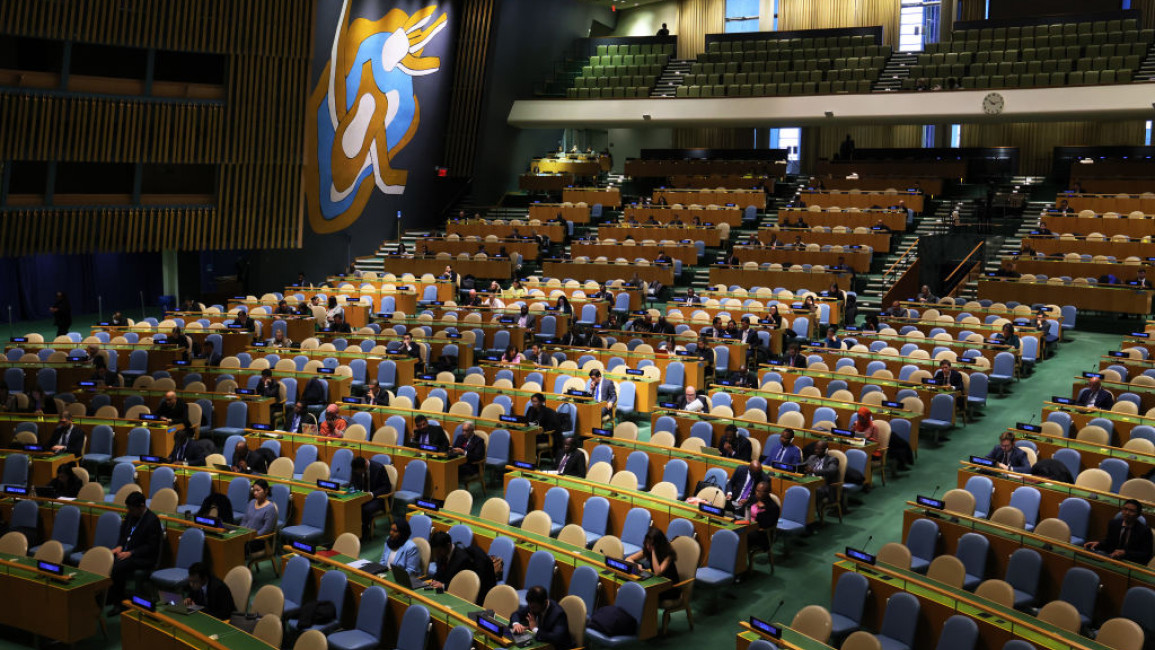Can UN Resolution 377 be used to overturn the US's Gaza ceasefire veto?
The United States vetoed a UN Security Council resolution calling for a ceasefire in the Gaza war on Friday.
The draft would otherwise have been adopted, with the UK abstaining and the remaining 13 members of the council voting in favour.
The resolution's failure dashed what was a glimmer of hope for a speedy end to Israel's indiscriminate assault on Gaza, which has seen homes, hospitals, and ambulances attacked and nearly 18,000 people killed.
In light of the US's ongoing use of its veto, activists, officials, and NGOs have suggested using UN General Assembly Resolution 377 in order to bring about a ceasefire in Gaza, urging that the resolution be invoked to "overturn the US veto".
Egypt and Mauritania have requested the resumption of the 10th UN General Assembly emergency special session, which will now meet on Tuesday. The session, established in 1997 under the terms of Resolution 377, concerns "illegal Israeli actions" in occupied Palestine.
It has already met several times during the Gaza war, with a non-binding General Assembly resolution adopted in late October calling for an "an immediate, durable and sustained humanitarian truce leading to a cessation of hostilities".
What is UN Resolution 377 A (V)?
In an ironic twist, the United States was instrumental in the creation of UN Resolution 377 A (V), which bears the name "Uniting for Peace".
The resolution was passed by the General Assembly in 1950. Its purpose was to counter the USSR and prevent it from stopping the Security Council from assisting South Korea, which was under attack from Moscow's ally North Korea.
The US, UK, France, China, and now Russia - the USSR's successor state - have the power to veto Security Council resolutions in their roles as permanent members of the body.
"Uniting for Peace" stipulates that the General Assembly shall act if the Security Council, "because of lack of unanimity of the permanent members, fails to exercise its primarily responsibility for the maintenance of international peace and security in any case where there appears to be a threat to the peace, breach of the peace, or act of aggression".
Not binding
But the scope of the power given to the General Assembly is not unlimited. It does not extend to making binding decisions like the Security Council can.
However, when Resolution 377 was invoked amid the Suez Crisis in 1956, it led to the creation of the UN's first peacekeeping force and helped end the Israeli, British, and French tripartite invasion of Egypt and Gaza.
"Uniting for Peace" resolves that the General Assembly shall "consider the matter immediately with a view to making appropriate recommendations" to member states for "collective measures, including in the case of a breach of the peace or act of aggression the use of armed force when necessary, to maintain or restore international peace and security".
If the General Assembly is not in session, it may meet in an "emergency special session" within 24 hours of this being requested by sufficient majorities either among its members or on the Security Council.
In the case of the 10th emergency session on illegal Israeli actions in Palestine, the president of the General Assembly said it would reconvene on Tuesday "in accordance with Resolution ES-10/21", which authorised him to "resume its meeting upon request from member states".
Muhammad Danial Azman, an expert in conflict studies at Universiti Malaya, affirmed that the Security Council has ultimate authority.
"[The] UNSC [Security Council] is the highest body of the UN system and has the final say against any status quo of a resolution," he was quoted as saying by Malaysian newspaper the New Straits Times.
"Only [a] resolution passed by the UNSC is a real international law, and they are binding in nature."
Ukraine
Resolution 377 has led to the creation of 11 emergency special sessions, but only two remain unconcluded.
These are the 10th session, the one on Palestine reconvening on Tuesday, and the 11th.
The 11th session was established last year following Russia's invasion of Ukraine and it has met 19 times, most recently in February 2023.
It is currently temporarily adjourned but can be resumed by the General Assembly's president at the request of member states.



